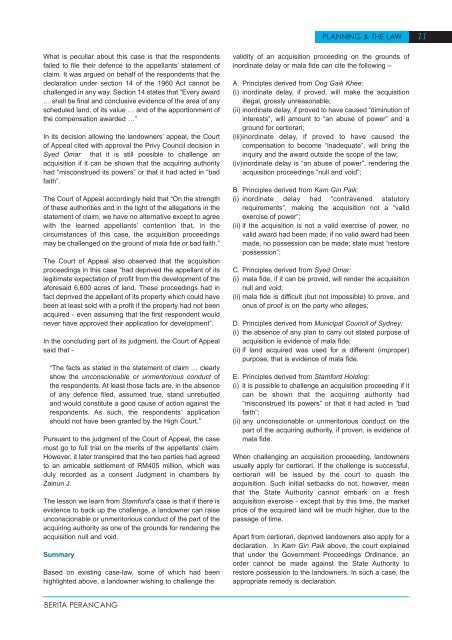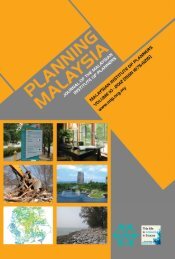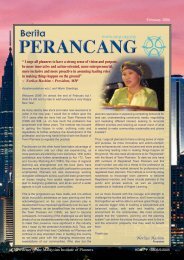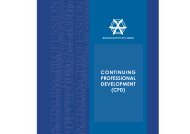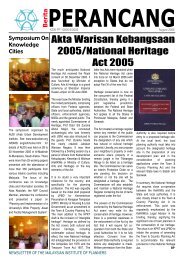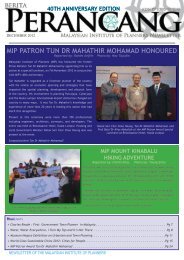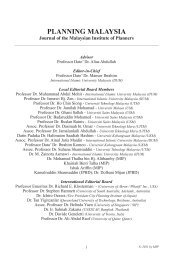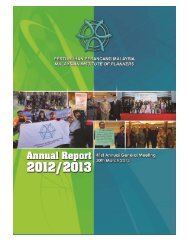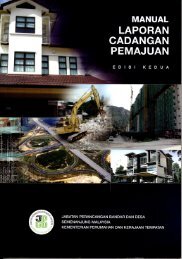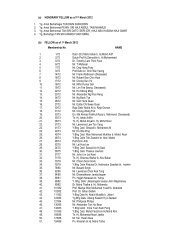Download November 2005 Issue - Malaysian Institute of Planners
Download November 2005 Issue - Malaysian Institute of Planners
Download November 2005 Issue - Malaysian Institute of Planners
You also want an ePaper? Increase the reach of your titles
YUMPU automatically turns print PDFs into web optimized ePapers that Google loves.
PLANNING & THE LAW 11What is peculiar about this case is that the respondentsfailed to file their defence to the appellants’ statement <strong>of</strong>claim. It was argued on behalf <strong>of</strong> the respondents that thedeclaration under section 14 <strong>of</strong> the 1960 Act cannot bechallenged in any way. Section 14 states that “Every award… shall be final and conclusive evidence <strong>of</strong> the area <strong>of</strong> anyscheduled land, <strong>of</strong> its value … and <strong>of</strong> the apportionment <strong>of</strong>the compensation awarded …”In its decision allowing the landowners’ appeal, the Court<strong>of</strong> Appeal cited with approval the Privy Council decision inSyed Omar that it is still possible to challenge anacquisition if it can be shown that the acquiring authorityhad “misconstrued its powers” or that it had acted in “badfaith”.The Court <strong>of</strong> Appeal accordingly held that “On the strength<strong>of</strong> these authorities and in the light <strong>of</strong> the allegations in thestatement <strong>of</strong> claim, we have no alternative except to agreewith the learned appellants’ contention that, in thecircumstances <strong>of</strong> this case, the acquisition proceedingsmay be challenged on the ground <strong>of</strong> mala fide or bad faith.”The Court <strong>of</strong> Appeal also observed that the acquisitionproceedings in this case “had deprived the appellant <strong>of</strong> itslegitimate expectation <strong>of</strong> pr<strong>of</strong>it from the development <strong>of</strong> theaforesaid 6,600 acres <strong>of</strong> land. These proceedings had infact deprived the appellant <strong>of</strong> its property which could havebeen at least sold with a pr<strong>of</strong>it if the property had not beenacquired - even assuming that the first respondent wouldnever have approved their application for development”.In the concluding part <strong>of</strong> its judgment, the Court <strong>of</strong> Appealsaid that -“The facts as stated in the statement <strong>of</strong> claim … clearlyshow the unconscionable or unmeritorious conduct <strong>of</strong>the respondents. At least those facts are, in the absence<strong>of</strong> any defence filed, assumed true, stand unrebuttedand would constitute a good cause <strong>of</strong> action against therespondents. As such, the respondents’ applicationshould not have been granted by the High Court.”Pursuant to the judgment <strong>of</strong> the Court <strong>of</strong> Appeal, the casemust go to full trial on the merits <strong>of</strong> the appellants’ claim.However, it later transpired that the two parties had agreedto an amicable settlement <strong>of</strong> RM405 million, which wasduly recorded as a consent Judgment in chambers byZainun J.The lesson we learn from Stamford’s case is that if there isevidence to back up the challenge, a landowner can raiseunconscionable or unmeritorious conduct <strong>of</strong> the part <strong>of</strong> theacquiring authority as one <strong>of</strong> the grounds for rendering theacquisition null and void.SummaryBased on existing case-law, some <strong>of</strong> which had beenhighlighted above, a landowner wishing to challenge thevalidity <strong>of</strong> an acquisition proceeding on the grounds <strong>of</strong>inordinate delay or mala fide can cite the following –A. Principles derived from Ong Gaik Khee:(i) inordinate delay, if proved, will make the acquisitionillegal, grossly unreasonable;(ii) inordinate delay, if proved to have caused “diminution <strong>of</strong>interests”, will amount to “an abuse <strong>of</strong> power” and aground for certiorari;(iii)inordinate delay, if proved to have caused thecompensation to become “inadequate”, will bring theinquiry and the award outside the scope <strong>of</strong> the law;(iv)inordinate delay is “an abuse <strong>of</strong> power”, rendering theacquisition proceedings “null and void”;B. Principles derived from Kam Gin Paik:(i) inordinate delay had “contravened statutoryrequirements”, making the acquisition not a “validexercise <strong>of</strong> power”;(ii) if the acquisition is not a valid exercise <strong>of</strong> power, novalid award had been made; if no valid award had beenmade, no possession can be made; state must “restorepossession”;C. Principles derived from Syed Omar:(i) mala fide, if it can be proved, will render the acquisitionnull and void;(ii) mala fide is difficult (but not impossible) to prove, andonus <strong>of</strong> pro<strong>of</strong> is on the party who alleges;D. Principles derived from Municipal Council <strong>of</strong> Sydney:(i) the absence <strong>of</strong> any plan to carry out stated purpose <strong>of</strong>acquisition is evidence <strong>of</strong> mala fide;(ii) if land acquired was used for a different (improper)purpose, that is evidence <strong>of</strong> mala fide.E. Principles derived from Stamford Holding:(i) it is possible to challenge an acquisition proceeding if itcan be shown that the acquiring authority had“misconstrued its powers” or that it had acted in “badfaith”;(ii) any unconscionable or unmeritorious conduct on thepart <strong>of</strong> the acquiring authority, if proven, is evidence <strong>of</strong>mala fide.When challenging an acquisition proceeding, landownersusually apply for certiorari. If the challenge is successful,certiorari will be issued by the court to quash theacquisition. Such initial setbacks do not, however, meanthat the State Authority cannot embark on a freshacquisition exercise - except that by this time, the marketprice <strong>of</strong> the acquired land will be much higher, due to thepassage <strong>of</strong> time.Apart from certiorari, deprived landowners also apply for adeclaration. In Kam Gin Paik above, the court explainedthat under the Government Proceedings Ordinance, anorder cannot be made against the State Authority torestore possession to the landowners. In such a case, theappropriate remedy is declaration.BERITA PERANCANG


